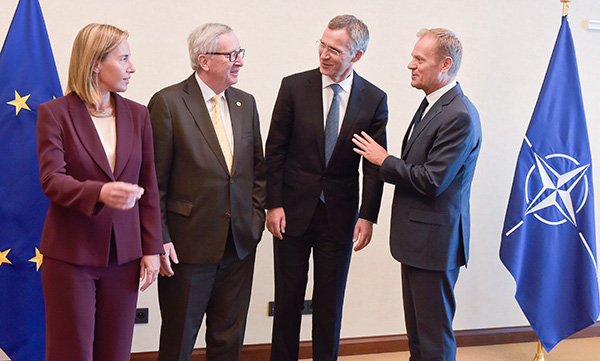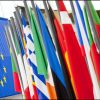
They have been living together in Brussels since 1966, but with their backs to each other, as though ‘on different planets’, as the President of the European Council Donald Tusk put it. The recent crises and threats, their complementary nature in a world in which nothing is entirely resolved by military might alone, even though it continues being necessary, and the psycho-political impact of the Brexit referendum have persuaded the EU and the Atlantic Alliance to finally move in together at the NATO summit in Warsaw and make headway towards closer cooperation. It has not been easy. Nor will it be easy in the future to put this relationship into practice.
‘Our security is interconnected’, said Jens Stoltenberg, the Norwegian head of NATO, and it is true that the new risks and threats do not respect boundaries between countries, let alone between organisations. The Warsaw agreement between the Presidents of the European Council and the Commission and the Secretary General of NATO establishing a ‘strategic partnership’ in security and defence seeks to address hybrid threats –the combination of propaganda and irregular forces, as seen in the Russian annexation of Crimea and in eastern Ukraine– in a joint manner. In 2017 and 2018 the two organisations will for the first time carry out parallel and coordinated exercises in this regard, as well as cooperating on intelligence, forecasting and cyber security, the latter becoming a domain in itself for NATO, given that it already has its own command structure in the US. It is a step towards the ‘civil union’ between the Alliance and the EU that needs to be seen in the context of what Federica Mogherini’s Global Strategy for the European Union’s Foreign and Security Policy says on the matter: this describes NATO as being the ‘primary framework’ for the collective defence of the majority of EU member states, and advocates such cooperation. It reflects the fact that the President of Finland and the Prime Minister of Sweden, member states of the EU but not of NATO, took part in the Warsaw meeting.
NATO is undoubtedly vastly superior in terms of its capacity for military planning and the forces at its disposal, although here the EU can now make progress in an area that the British formerly blocked. The EU is, however, much more capable in terms of civil security and the combined civilian and military approach, although the role played by the EU in this respect in Afghanistan has passed by largely unnoticed. In the Indian Ocean off the coast of Somalia there have been two parallel operations against piracy, one led by NATO (Operation Ocean Shield), and the other by the EU (Atalanta), both successfully ensuring the safe passage of maritime shipping, although one of them could have been dispensed with.
The ‘arc of insecurity and instability along NATO’s periphery and beyond’ that is referred to in the Warsaw summit’s extremely lengthy (30-page) final communiqué is real. NATO looks towards Russia, with its new military deployments, limited and dissuasive rather than effective, in Poland and the Baltic states. The divisions in the EU regarding sanctions against Moscow may resurface, however, when they come up for review and renewal in a few months’ time, a renewal that this time will not be automatic. The other theatre NATO has set its sights on is the East, from where part of Jihadist terrorism currently emanates; in response to which, whether it has been in Ankara, Paris or Brussels, none of the victims has wanted to invoke article 5 of NATO concerning solidarity, as was done after the September 11 2001 attacks against the US. NATO is set to launch a new operation to control the stream of migrants fleeing the chaos into which Libya has descended (where both NATO and the EU share some of the burden of responsibility), and may complement the European Border and Coast Guard that the EU is setting up to replace Frontex, similarly operating on both land and at sea.
But NATO looks far less towards a third theatre, the rest of North Africa and sub-Saharan Africa, particularly the Sahel, the origin of threats. This is not for want of trying on Spain’s part, but because France has blocked it –they are its former colonies and it does not want the Alliance to meddle– although it cooperates with the EU and bilaterally with the US. The latter, as Félix Arteaga has rightly pointed out, prefers to give priority to its African command (AFRICOM) in this regard, where the Morón military base in Spain plays a significant role.
One problem for the Europeans, whether in NATO or in the EU, is their military capabilities. Although military spending has stopped declining after years of economic crisis, and 16 NATO members increased their budgets last year, as a report by the Centre for European Reform (CER) points out, the combat readiness of many European countries’ armed forces leaves much to be desired, especially in comparison with the US. In 2014, for instance, a parliamentary report in Germany acknowledged that almost half their combat aircraft were not operational. The same applies to other countries. Berlin has resolved to play a more active and powerful role in the development of Europe’s armed forces. But little good will it do the EU’s ‘strategic autonomy’ being promoted by Mogherini –in other words the ability to act without NATO or the US– if the Europeans simply spend more without spending more wisely.
The boost Blair and Chirac gave to a joint European defence policy in the 1998 Saint-Malo declaration amounted to nothing. Later came the bilateral military cooperation of the 2010 Lancaster House accords between France and the UK, where the effects of Brexit remain to be seen. Paradoxically, despite the prospect of a British exit, desire is growing in the EU for greater military autonomy, certainly, but it is also becoming more focused on the Atlantic and cooperation with NATO: in other words, with the US.


